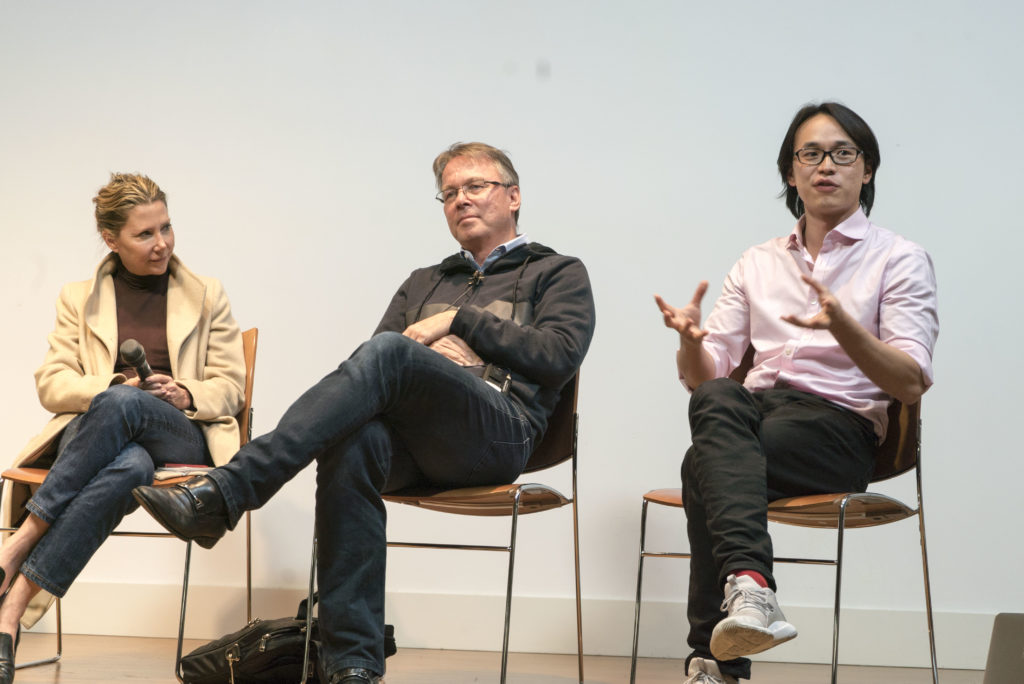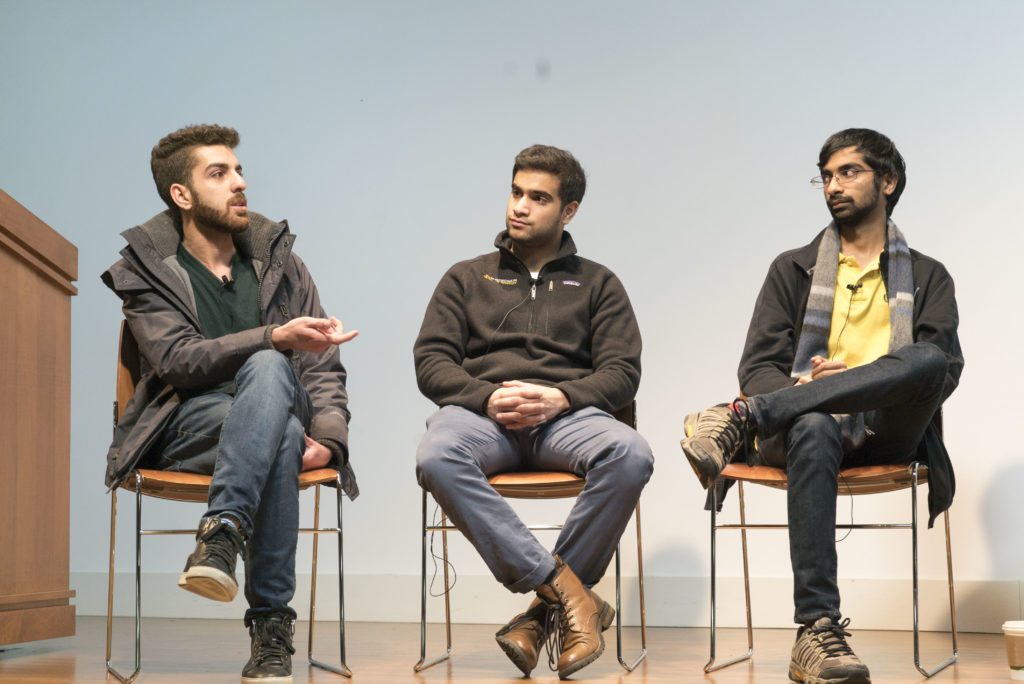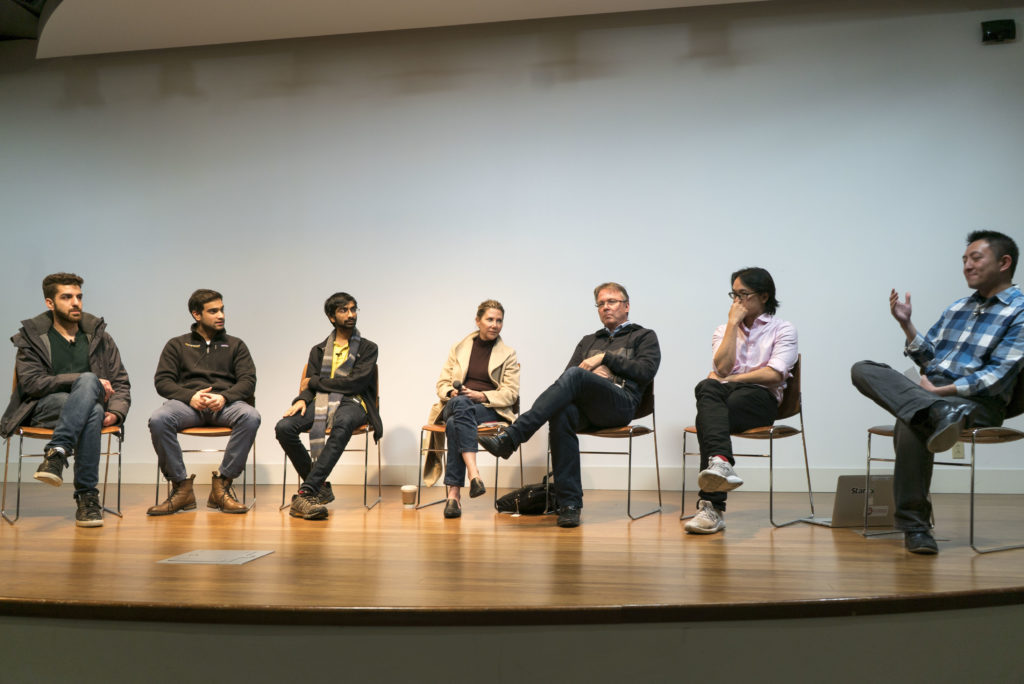Breaking the Blockchain Bubble: A roundtable discussing the future of blockchain technology
On March 1st, the Blockchain Lab hosted a roundtable with three industry leaders along with student representatives from Blockchain at Berkeley to discuss the importance and growth of this groundbreaking technology. CEOs from ThirdACT, CryptoWerk, and Legal.io showcased how different industries are able to find faster solutions with the implementation of blockchain. Ikhlaq Sidhu, chief scientist and founder of SCET, introduced the event by explaining blockchain’s impact on the Berkeley community and what steps Berkeley has taken to solve problems using its technology.
Throughout the blockchain panel, students from Professor Po Chi Wu’s Blockchain Challenge Lab class (IEOR 185) and others from industry who are interested in the technology, were able to interact with our panelists. Attendees asked about how quickly blockchain will be deployed, how trust will be truly established through the use of the technology, and whether new industries will be able to adopt the blockchain technology quickly.
Another major question that emerged was where blockchain technology will be five years from today and how broad the adoption will be by then. Panelists responded saying that blockchain is already being used in many supply chain and medical regulatory compliance applications and will continue to emerge in other most other if not all industries. Dirk Kanngiesser stated there is a $2 billion problem in certain supply chain systems due to wholesaling and over supplying. To solve the problem, Kanngiesser created a centralized database of hashers. This way, he was able to hash every package, and now when it comes to the wholesaler, all they have to do is use an application to rehash the package and make a hash to hash comparison. These kinds of use cases tend to solve big industrial problems and Diane Schrader added that it does serve the individual because it is putting the authenticity back into the consumers hands.

Tony Lai discussing the importance of legality within the blockchain community.
Nick Zoghb expanded on the idea of how blockchain started and why it was created. Blockchain was developed in order to build a community-based technology that allowed all individuals to be empowered in a unique way and be able to gain the same amount of capital and return as a big company. Instead of removing trust from all parties, blockchain allows for everyone to trust anyone on the network with having known the individual. Ashwinee Panda continued by stating that every individual in the network has one goal — to make more money. That being said, each individual working to get more tokens trusts the others working with them because they trust that everyone else is trying to maximize the amount of money they want to eventually gain.

B@B representative explaining the importance of trust within blockchain technology
Zubin Koticha brought up the concern regarding trust within the value of money in other countries. In the United States, the value of the dollar fluctuates minimally, however in countries with hyperinflation and capital controls, you cannot trust any central databases or entities. In such cases, all the money that an individual makes disappears due to the hyperinflation and they cannot change currencies because of the strict capital controls. This is when individuals escape the centralized system through bitcoin and that allows this individual to hold some value to their currency.
Although there seems to be a lot of opportunity with blockchain technology, transaction speed continues to be lagging behind. In any industry with several intermediaries, there is a higher chance of fraud and lack of transparency. Blockchain eliminates several of these intermediaries allowing for a shorter supply chain and fewer transactions, which ultimately increases transaction speed. However, since blockchain is still in its early stage, it does not offer major improvements to transaction speeds. The reason for this slow speed is a result of writing, encrypting and verifying growing blocks which takes a significant amount of computing power. Looking again to the future, panelists discussed an increase in transaction speed with blockchain versus current financial systems. Many of the panelists were optimistic that blockchain’s transaction speed limitations will be resolved as the technology continues to evolve as there is so much research currently being done.
About the Panelists
ThirdACT
CEO, Diane Schrader

ThirdACT takes investment contracts, aggregates them into a portfolio, and tokenizes these portfolios to allow for multiple investors to participate. ThirdACT chose to use blockchain in order to solve security issues while also having lower cost transactions. They enable property owners to share a small piece of their future sale value in exchange for the financing of building improvements today.
CryptoWerk
CEO, Dirk Kanngiesser

“Cryptowerk offers a proven, trusted, enterprise-grade Digital Trust Engine that makes it easy for organizations in multiple industries to rapidly develop and station blockchain-enabled applications.” Cryptowerk is a SAP certified platform that has also developed technology that can handle 600K transactions per second. CyptoWerk builds trust into every one of its products, but in order for this to happen, CyrptoWerk partners with industry leaders to help verify the authenticity to a massive scale.
Legal.io
CEO, Tony Lai

Legal.io provides software services to lawyers and legal service organizations. Legal.io’s solutions empower their clients to understand and react to a rapid changing legal landscape. Legal.io started to address the billable hours issue, which was an economic incentive to make more efficient legal services. However, through the implementation, Legal.io has created a new platform for legal engineering. Since Legal.io is opening a new industry within the blockchain community, there are still issues regarding trust, identity, data and misalignment of interests. However, noticing these ongoing problems, Legal.io has formed new organizational structures to make their product more trustworthy and reliable.
Blockchain at Berkeley
Representatives Nick Zoghb (Head of Education), Zubin Koticha (Head of R&D), and Ashwinee Panda (Blockchain Entrepreneur) came on behalf of Blockchain at Berkeley.

Blockchain at Berkeley (B@B) is a student organization dedicated to serving the East Bay and several crypto communities. B@B has three divisions: education, consultancy, and research and development. B@B works to grow the education of blockchain to its members and to students at UC Berkeley by offering The Blockchain Fundamentals DeCal, workshops, developer tutorials and more. B@B also consults for several companies and sees how blockchain can help solve challenging problems. Lastly, the organization also consistently builds and develops side projects that place at several hackathons and competitions.
Connect with and follow our panelists:
Diane Schrader, thirdACT
On March 1st, the Blockchain Lab hosted a roundtable with three industry leaders along with student representatives from Blockchain at Berkeley to discuss the importance and growth of this groundbreaking technology. CEOs from ThirdACT, CryptoWerk, and Legal.io showcased how different industries are able to find faster solutions with the implementation of blockchain. Ikhlaq Sidhu, chief scientist and founder of SCET, introduced the event by explaining blockchain’s impact on the Berkeley community and what steps Berkeley has taken to solve problems using its technology.
Throughout the blockchain panel, students from Professor Po Chi Wu’s Blockchain Challenge Lab class (IEOR 185) and others from industry who are interested in the technology, were able to interact with our panelists. Attendees asked about how quickly blockchain will be deployed, how trust will be truly established through the use of the technology, and whether new industries will be able to adopt the blockchain technology quickly.
Another major question that emerged was where blockchain technology will be five years from today and how broad the adoption will be by then. Panelists responded saying that blockchain is already being used in many supply chain and medical regulatory compliance applications and will continue to emerge in other most other if not all industries. Dirk Kanngiesser stated there is a $2 billion problem in certain supply chain systems due to wholesaling and over supplying. To solve the problem, Kanngiesser created a centralized database of hashers. This way, he was able to hash every package, and now when it comes to the wholesaler, all they have to do is use an application to rehash the package and make a hash to hash comparison. These kinds of use cases tend to solve big industrial problems and Diane Schrader added that it does serve the individual because it is putting the authenticity back into the consumers hands.

Tony Lai discussing the importance of legality within the blockchain community.
Nick Zoghb expanded on the idea of how blockchain started and why it was created. Blockchain was developed in order to build a community-based technology that allowed all individuals to be empowered in a unique way and be able to gain the same amount of capital and return as a big company. Instead of removing trust from all parties, blockchain allows for everyone to trust anyone on the network with having known the individual. Ashwinee Panda continued by stating that every individual in the network has one goal — to make more money. That being said, each individual working to get more tokens trusts the others working with them because they trust that everyone else is trying to maximize the amount of money they want to eventually gain.

B@B representative explaining the importance of trust within blockchain technology
Zubin Koticha brought up the concern regarding trust within the value of money in other countries. In the United States, the value of the dollar fluctuates minimally, however in countries with hyperinflation and capital controls, you cannot trust any central databases or entities. In such cases, all the money that an individual makes disappears due to the hyperinflation and they cannot change currencies because of the strict capital controls. This is when individuals escape the centralized system through bitcoin and that allows this individual to hold some value to their currency.
Although there seems to be a lot of opportunity with blockchain technology, transaction speed continues to be lagging behind. In any industry with several intermediaries, there is a higher chance of fraud and lack of transparency. Blockchain eliminates several of these intermediaries allowing for a shorter supply chain and fewer transactions, which ultimately increases transaction speed. However, since blockchain is still in its early stage, it does not offer major improvements to transaction speeds. The reason for this slow speed is a result of writing, encrypting and verifying growing blocks which takes a significant amount of computing power. Looking again to the future, panelists discussed an increase in transaction speed with blockchain versus current financial systems. Many of the panelists were optimistic that blockchain’s transaction speed limitations will be resolved as the technology continues to evolve as there is so much research currently being done.
About the Panelists
ThirdACT
CEO, Diane Schrader

ThirdACT takes investment contracts, aggregates them into a portfolio, and tokenizes these portfolios to allow for multiple investors to participate. ThirdACT chose to use blockchain in order to solve security issues while also having lower cost transactions. They enable property owners to share a small piece of their future sale value in exchange for the financing of building improvements today.
CryptoWerk
CEO, Dirk Kanngiesser

“Cryptowerk offers a proven, trusted, enterprise-grade Digital Trust Engine that makes it easy for organizations in multiple industries to rapidly develop and station blockchain-enabled applications.” Cryptowerk is a SAP certified platform that has also developed technology that can handle 600K transactions per second. CyptoWerk builds trust into every one of its products, but in order for this to happen, CyrptoWerk partners with industry leaders to help verify the authenticity to a massive scale.
Legal.io
CEO, Tony Lai

Legal.io provides software services to lawyers and legal service organizations. Legal.io’s solutions empower their clients to understand and react to a rapid changing legal landscape. Legal.io started to address the billable hours issue, which was an economic incentive to make more efficient legal services. However, through the implementation, Legal.io has created a new platform for legal engineering. Since Legal.io is opening a new industry within the blockchain community, there are still issues regarding trust, identity, data and misalignment of interests. However, noticing these ongoing problems, Legal.io has formed new organizational structures to make their product more trustworthy and reliable.
Blockchain at Berkeley
Representatives Nick Zoghb (Head of Education), Zubin Koticha (Head of R&D), and Ashwinee Panda (Blockchain Entrepreneur) came on behalf of Blockchain at Berkeley.

Blockchain at Berkeley (B@B) is a student organization dedicated to serving the East Bay and several crypto communities. B@B has three divisions: education, consultancy, and research and development. B@B works to grow the education of blockchain to its members and to students at UC Berkeley by offering The Blockchain Fundamentals DeCal, workshops, developer tutorials and more. B@B also consults for several companies and sees how blockchain can help solve challenging problems. Lastly, the organization also consistently builds and develops side projects that place at several hackathons and competitions.
Connect with and follow our panelists:
Diane Schrader, thirdACT


